Catena is now Pearl Talent! Same mission, new name.
Your front desk is the heart of your patient experience. It’s the first impression new patients get—and often the last interaction they remember. But as your clinic grows, managing every call, message, and scheduling request in-house can become overwhelming.
At Pearl Talent, we help healthcare practices hire trained virtual medical receptionists in under two weeks. Our talent pool includes professionals with experience in EHRs, insurance workflows, and patient communication tools. Whether you’re a solo provider or scaling a multi-location group, we’ll match you with virtual support that fits your clinic’s needs.
In this guide, we’ll walk through:
- What a virtual medical receptionist is
- Their core responsibilities
- Key benefits for your clinic
- The skills you should look for
- How to find and hire the right person
If you’ve been thinking about how virtual medical receptionists work, you are at the right place. Let’s dive in!
What Is a Virtual Medical Receptionist?
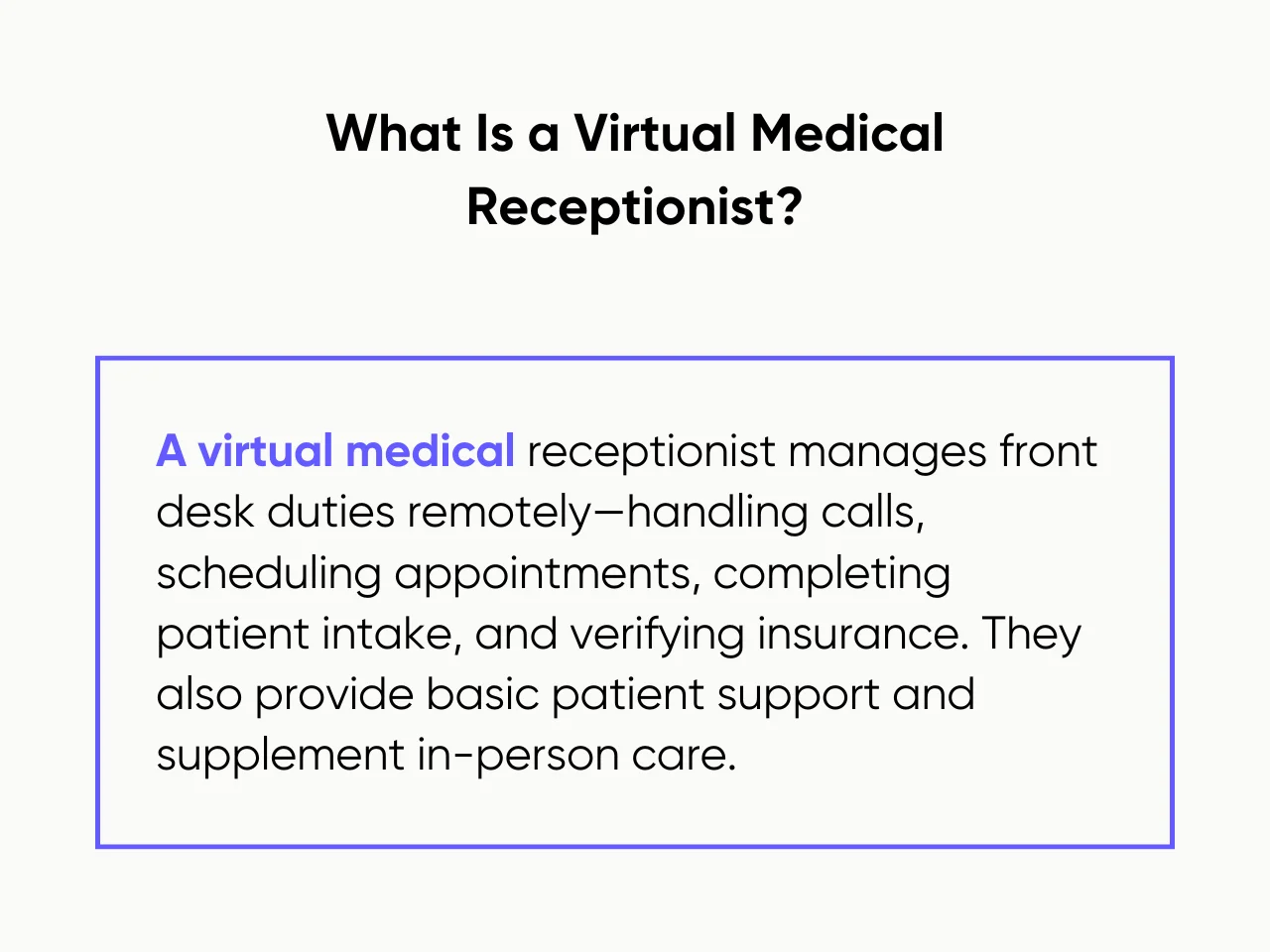
A virtual medical receptionist is trained to manage front desk responsibilities remotely, such as handling calls, scheduling appointments, completing patient intake, and verifying insurance. While working remotely, they can provide basic patient support and supplement in-person patient care.
Key Responsibilities of a Virtual Medical Receptionist
The medical virtual receptionist you hire can cover all the core administrative tasks your in-house receptionist handles, without adding to your operational overhead. They can schedule appointments, update patient information, and so much more.
Here’s what their key responsibilities typically include:
- Appointment Scheduling: Manage the procedure calendar, reschedule follow-ups, and send reminders to minimize no-shows.
- Phone and Email Communication: Handle incoming calls, triage messages, transfer calls, and answer patient inquiries professionally.
- Medical Records Management: Enter updates into your EHR, scan and upload documents, and make sure files are where they need to be.
- Virtual Waiting Room Support: Communicate delays or instructions to patients waiting or calling in, increasing patient satisfaction.
- Coordination with Medical Staff: Relay information between departments and stay synced with your providers.
- Billing and Payments: Help with basic billing, insurance verification, or co-pay collection.
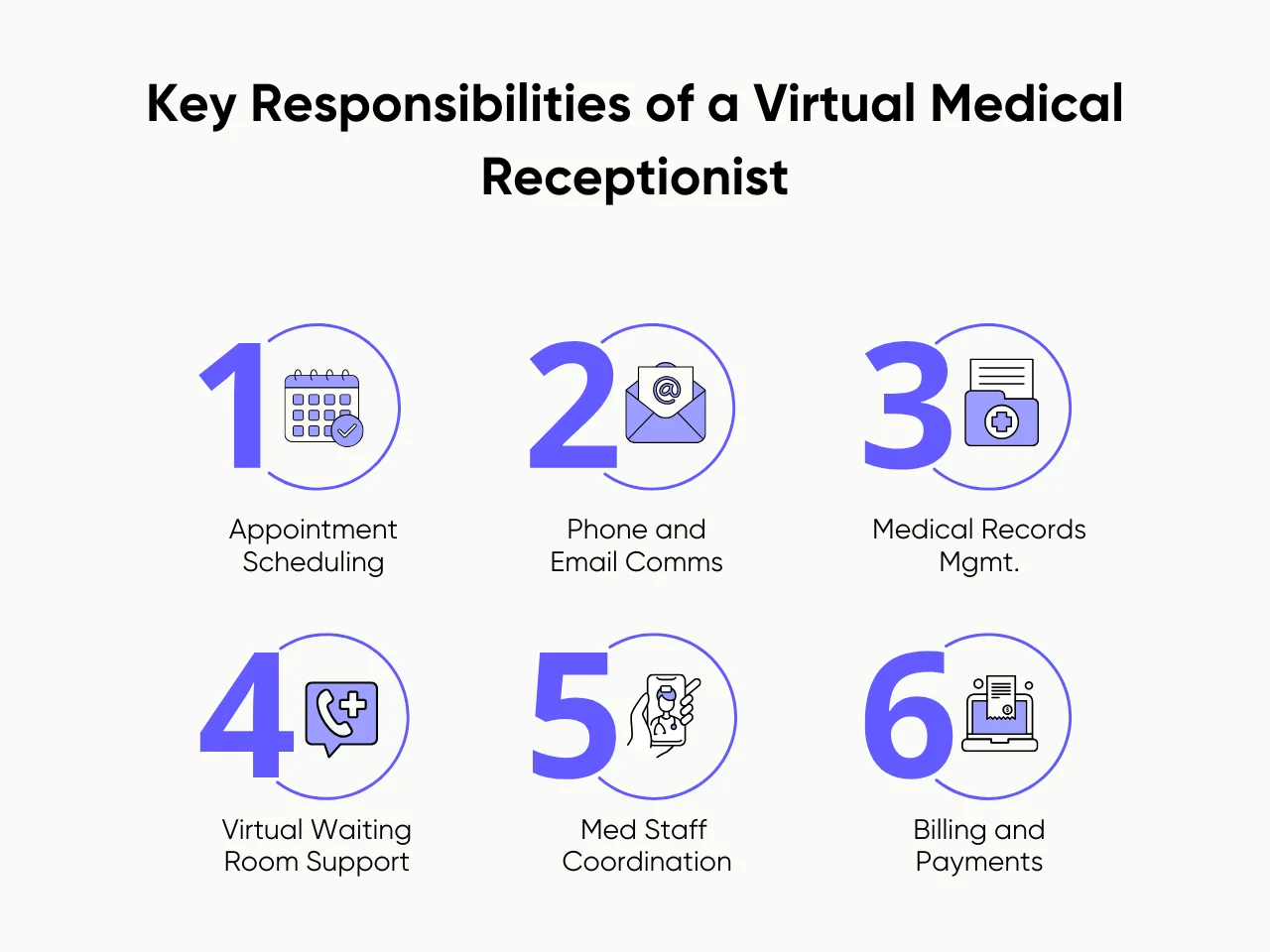
Virtual medical receptionists can often do much more than what people realize. They can take off as much as possible from your in-person team’s plate in a way that fits your workflow.
7 Benefits of Hiring a Virtual Medical Receptionist in Healthcare
We’ve worked with practices of all sizes that expanded their workforce to include virtual, and we’ve seen the impact it can have. These are the benefits we hear about most often after practices hire their virtual medical receptionist:
1. Lower Overhead Without Losing Quality
Hiring in-house means a full-time salary, benefits, training, office space, and equipment. A virtual receptionist for medical practice lets you skip most of that.
Whether that’s full-time, part-time, or coverage for peak hours, the setup is flexible. And if you’re hiring from the right provider or talent pool, you’re still getting someone experienced and healthcare-trained.
The cost savings are real, but so is the quality.
2. A More Positive Patient Experience
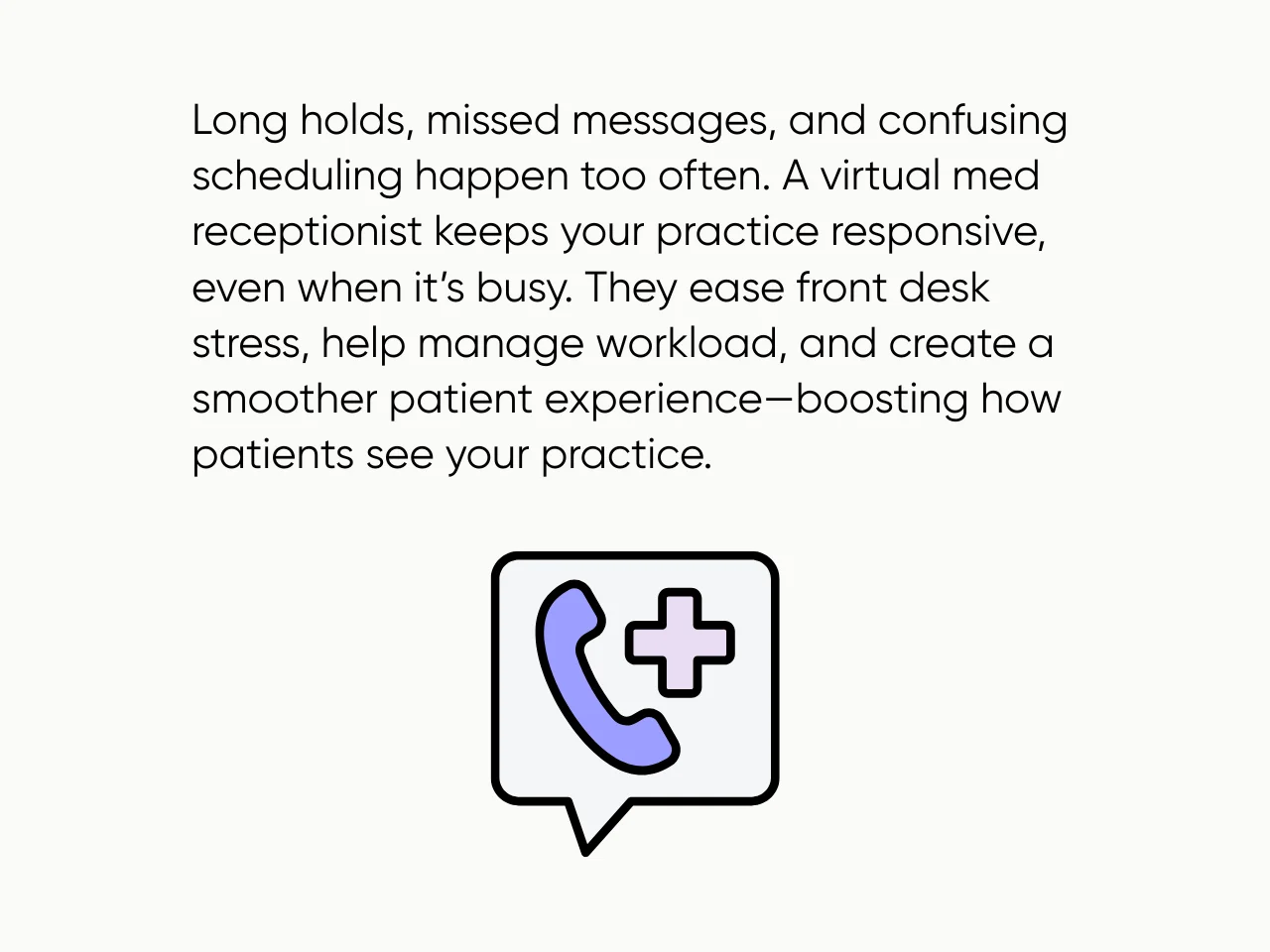
Long hold times, missed messages, and confusing scheduling are more common than they should be. A medical virtual receptionist helps your practice be more responsive, even when things get busy.
They can reduce the stress on your front desk and help handle the workload. By creating a smoother experience for patients collectively, a reliable front desk team can improve patients' perceptions of your entire practice.
3. Grow without Growing Pains
When your patient load increases seasonally, you don’t need to scramble to hire and train another in-house staff member. Just scale your virtual support.
Adding a second or third virtual receptionist can be done in days, not weeks. It gives you room to respond to unpredictable staffing changes without disrupting your current operations.
4. Support Outside Office Hours
By hiring staff across different time zones, you can extend your coverage without requiring your employees to work overtime. Extra availability outside of regular office hours can significantly benefit patients who need their questions answered. Additionally, a virtual medical receptionist can assist patients by directing them to the appropriate contact numbers to reach for time-sensitive concerns.
5. Multilingual Support for Diverse Populations
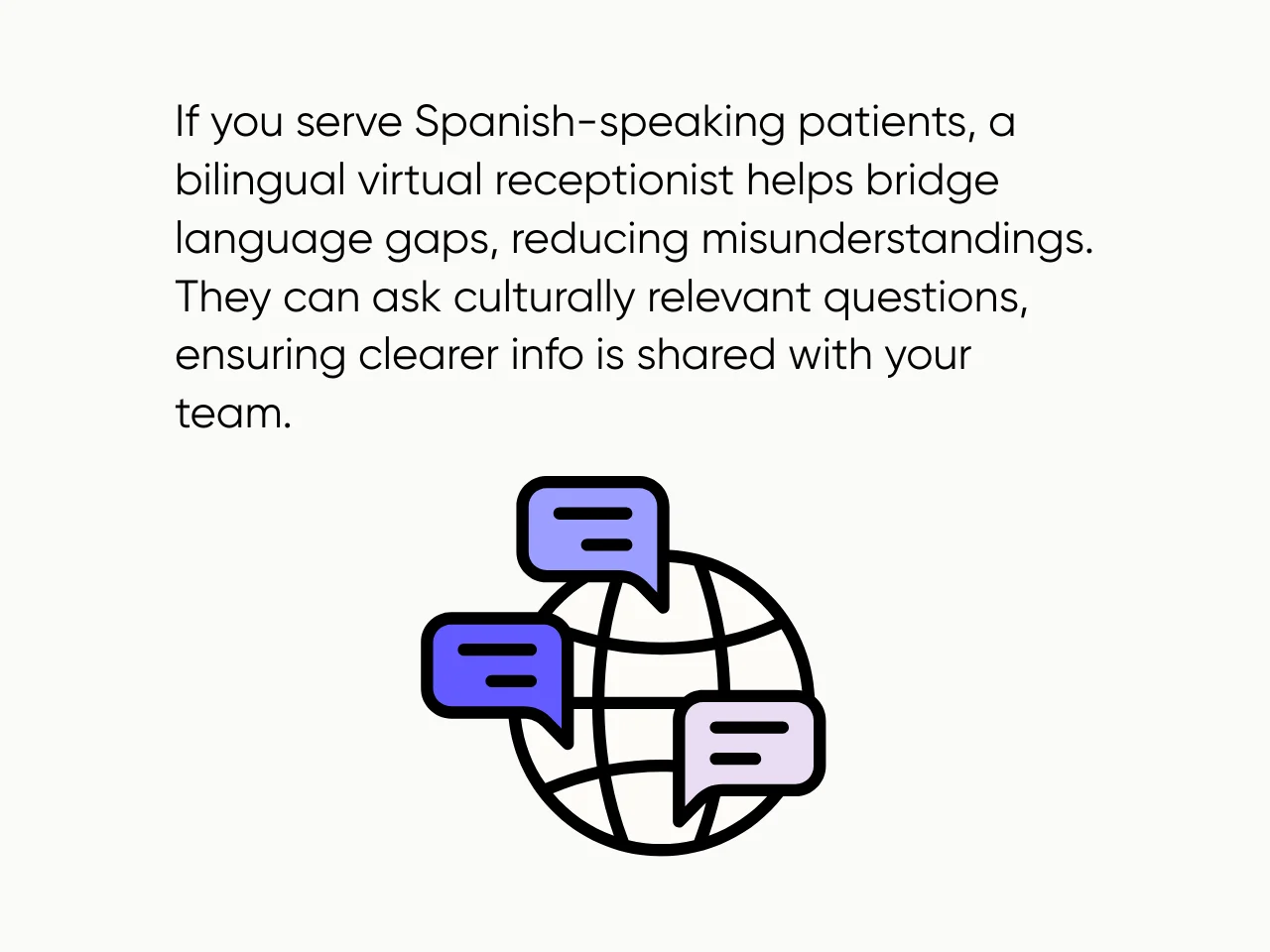
If your patient base includes Spanish-speaking communities, a bilingual virtual receptionist can make a huge difference. Language barriers can often lead to misunderstandings, which may result in incomplete or inaccurate information being recorded.
Your virtual medical receptionist can ask more specific and culturally relevant questions, which allows for a better understanding of the patient’s symptoms, concerns, and background to be passed onto the internal team.
6. More Automated Work
Virtual medical receptionists can often be more accustomed to automated systems. They can use tools such as EHRs, CRMs, and appointment software to automate reminders, check-ins, and basic intake.
When your in-house team collaborates with a virtual receptionist, it also increases their exposure to those systems. Over time, this raises your team’s digital fluency and makes future onboarding more efficient.
7. Your Team Can Focus Again
When the front desk is under-resourced, it affects care. We’ve seen medical assistants pulled away from patients to answer phones, as well as providers juggling charts and callbacks between appointments. All of these are signs that you may need more help delegating repetitive admin tasks.
This is why bringing in a remote medical receptionist for your practice can lead to fewer mistakes, delays, and burnout.
5 Tips on How to Hire a Virtual Medical Receptionist
Hiring remotely isn’t hard, but a little strategy goes a long way. Whether it’s your first hire or your fifth, these five tips will help you find a virtual medical receptionist:
1. Get Specific About the Role
Before hiring, take a closer look at your current operations. Are patients stuck on hold? Is your staff behind on follow-ups or insurance verifications? Identifying these gaps allows you to see where a virtual receptionist is needed.
Once you’ve identified the general areas you’d like to improve, take 10 minutes and list out the specific tasks. These could include:
- Answering high volumes of patient calls
- Forgetting to send appointment reminders
- Scheduling conflicts caused by frequently rescheduled visits
- Backlog of insurance verifications before procedures
The more specific you are about what you want help with, the easier it becomes to find the right person.
2. Ask About Compliance Early
Any experienced receptionist working in healthcare should be able to explain how they are compliant in plain terms: how they handle patient data, what tools they use, and what safeguards are in place.
If they follow a similar process, great. If not, ask follow-up questions about how they have handled patient data in previous jobs, such as: Have they worked in compliant systems? Do they understand privacy protocols and the importance of keeping protected health information (PHI) confidential?
Even if they won’t be accessing detailed clinical records, they’ll still interact with protected information. This is why at Pearl Talent, we carefully vet candidates who are experienced in compliance regulations. Don’t assume compliance—verify it. And if the answers are vague or overcomplicated, that’s a red flag.
3. Choose the Right Timezone
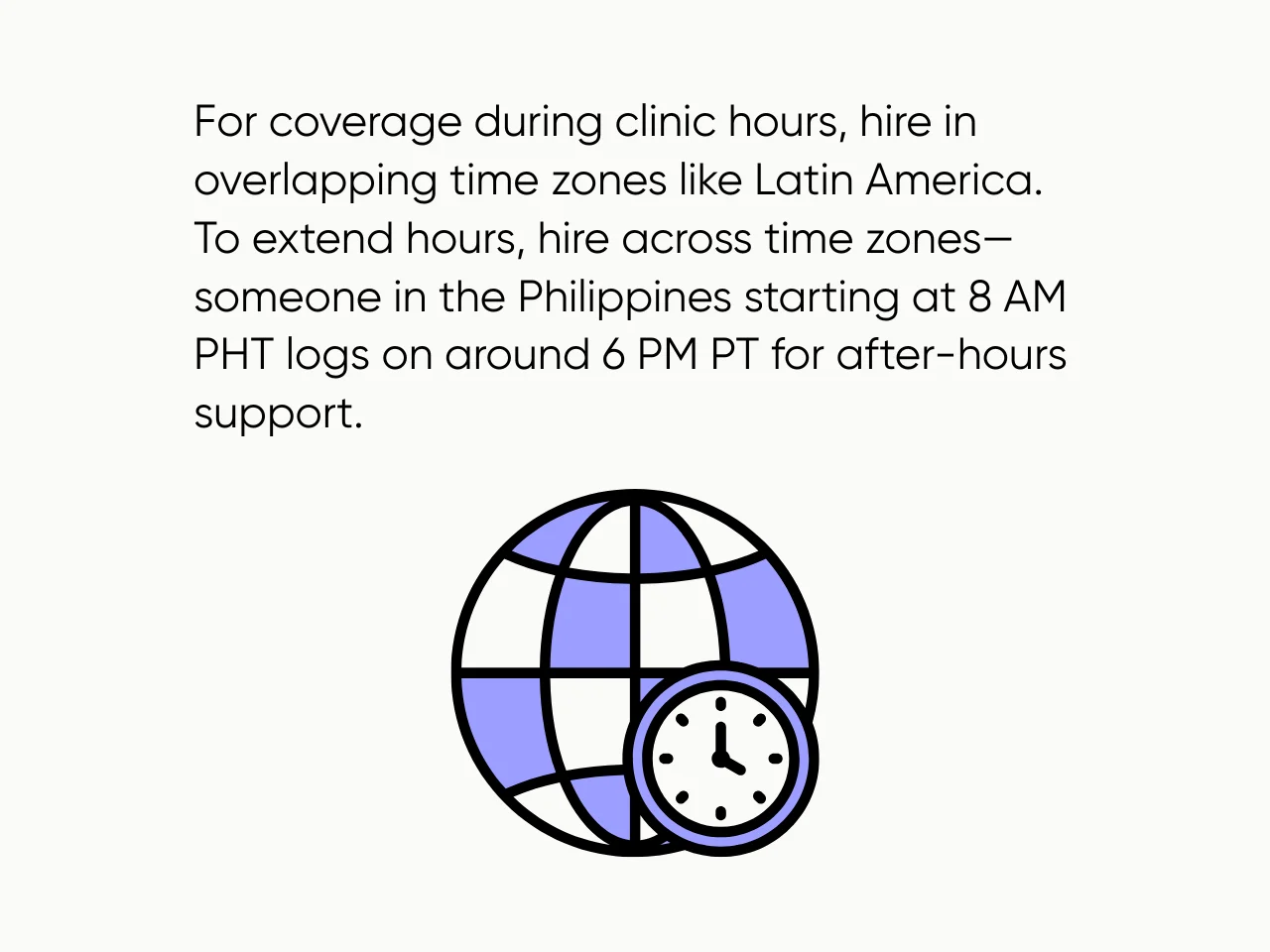
If you want someone who can be online during your clinic hours, focus on hiring from regions that overlap with your time zone, such as Latin America (which overlaps with Central time).
If you're looking to extend availability beyond your standard hours, hiring across time zones is even more advantageous. For example, someone in the Philippines who starts their day at 8:00 AM PHT would log on around 6:00 PM Pacific time. That means they can easily support your patients after your clinic has closed.
4. Test for Tech Comfort
Technology plays a crucial role in a virtual receptionist's daily tasks, as they frequently manage digital paperwork. It’s important to assess their comfort level with technical standard procedures.
They should be able to comfortably talk about their workflow on EHRs, telehealth apps, phone systems, etc. Ask them to walk you through a workflow. For example, how do they handle a patient scheduling request that comes in via email? Or how do they update information in an EHR after a call?
Working with a staffing partner can help you save time here. At Pearl Talent, we vet for technical skills and tool fluency upfront, so you’re not starting from scratch in your interviews.
5. Work with A Staffing Partner

While you can absolutely find a great virtual receptionist on your own, it often takes time. After reviewing dozens of applications, conducting interviews, and manually assessing tech and compliance skills, you may also face extra training costs.
Working with a staffing partner that provides virtual receptionist services gives you access to a broader pool of pre-vetted, healthcare professionals. At Pearl Talent, we make an extra effort after identifying talent to ensure they are actively contributing to your company’s growth. This can be especially valuable if you plan to hire more than one receptionist, or if you want the option to scale your team quickly as your clinic grows.
Key Takeaway
A dedicated virtual receptionist for your medical practice helps you run your front desk more efficiently. Besides being more affordable than in-person hires, they can improve your workflow and help create a better experience for your patients.
We’ve seen the difference hiring a virtual medical receptionist makes: better scheduling, fewer missed calls, and a team that can focus on clinical work instead of admin stress. If you’re spending more time managing the front desk than providing exceptional care, it might be time to look at a virtual option.
If you're ready to explore remote support, we can help you make the first hire a great one. With our years of experience in healthcare outsourcing, we offer free consultations to get started. Contact us today!
Frequently Asked Questions
Originally Published
April 29, 2025




.svg)


















